Please scroll to the bottom of the page for the English version.
- 「バンクーバー朝日」を知ったきっかけ
- バンクーバー朝日軍の歴史
- 2014年バンクーバー朝日軍の歴史に感銘を受けた現監督小川学さんらによって再結成された「新朝日」
- 日本野球特有の礼儀やマナーの価値の高さ
- 新たな角度から学ぶ日本の価値とバンクーバーの魅力
- The history of the 1914-established ‘Vancouver Asahi’ baseball team, and the ‘Nea Asahi’ formed in 2014, carrying on the spirit of the Asahi
- The opportunity to learn about the “Vancouver Asahi”
- The History of the Vancouver Asahi Baseball Team
- In 2014, inspired by the history of the Vancouver Asahi baseball team, the ‘Shin Asahi’ (New Asahi) was reformed by the current manager, Mr. Manabu Ogawa, and others.
- The high value of unique etiquette and manners in Japanese baseball
- Discovering the values of Japan and the charm of Vancouver from a new perspective
「バンクーバー朝日」を知ったきっかけ
皆さんは「バンクーバー朝日」というバンクーバーで結成されている野球チームをご存知ですか?
私はジャーナリストとして、2024年の1月に行われたバンクーバー朝日軍の創設10周年と戦前に朝日軍の選手としてご活躍された唯一の存命者である上西ケイさん(上集合写真中心、下写真右)の102歳のバースデーを祝うイベントを取材させていただく機会があり、それをきっかけに恥ずかしながら初めて「バンクーバー朝日」の存在を知りました。
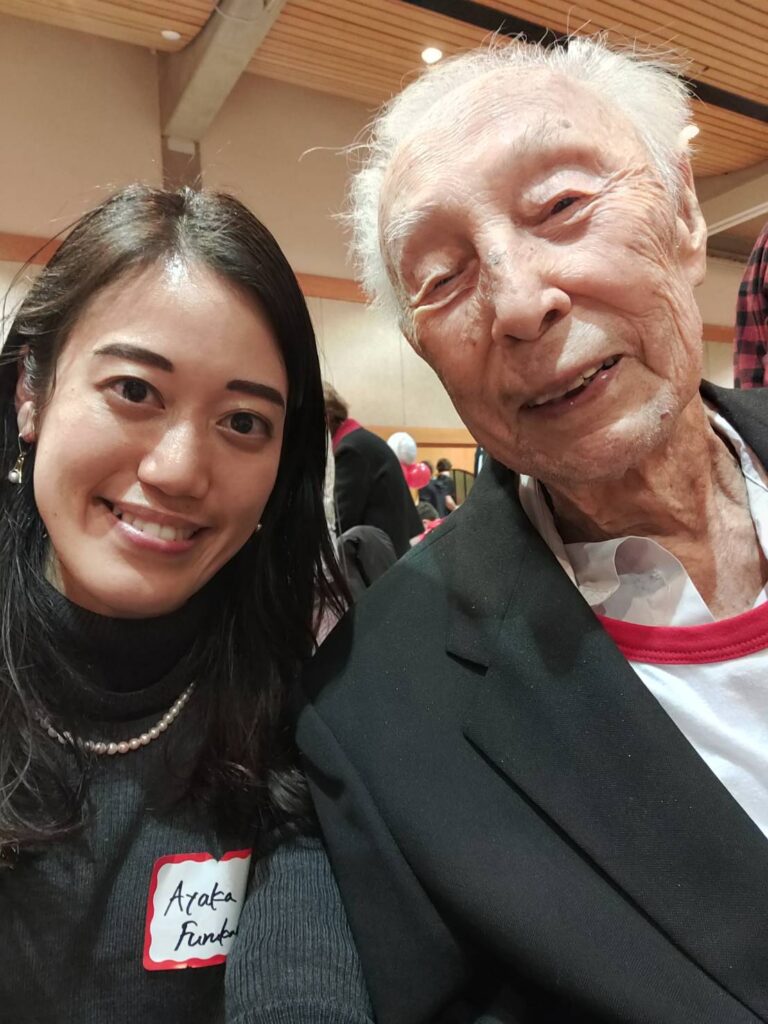
イベント時に上西ケイさんのお気持ちをお伺いすると「昔の記憶が思い起こされてとても懐かしい」と答えてくださいました。お会いできて光栄でした。
バンクーバー朝日軍の歴史
取材前に「バンクーバー朝日軍」の歴史を知りたい!と思い、調べ始めると彼らの日本人としての強い誇り、人種差別を受けながらも健闘した熱いストーリーに思わず涙が流れました。
バンクーバー朝日軍年表
1900年代初頭 バンクーバーには日本人街があり、活気に溢れていました。しかし日本人は人種差別と過酷な低賃金労働に耐えながらも懸命に働いたので、現地の白人たちが「日本人が白人の仕事を奪っている」という理由で追い出されたり、日本人街が襲撃されることもあったそうです。
1914年 そんな環境の中で「日本人の誇りを白人に見せつけたい」という思いから「バンクーバー朝日」という野球チームが結成されます。
初代監督は宮崎松次郎さんが就任。「馬車松」というあだ名がつくほど精力的な人物だったそう。「英語は話せなくても野球なら出来る」と当時15歳前後の日系二世の少年9人を選び抜いて猛特訓を始めます。当時の日系人社会からの支援を受けながら、猛練習の末強いチームに育っていきます。
1919年 結成5年目。マイナーリーグにあたるインターナショナルリーグでついに優勝を飾ります。
1921年 その後、低迷気味だった朝日はチームを再編成し、ハリー宮崎さんが新監督を務めます。彼はブリティッシュ・コロンビア州各地の白人チームから有力な選手を引き抜く一方、堅い守りとバントやエンドランなどの緻密な機動力を駆使する「Brain Ball」(頭脳野球)と呼ばれた戦術を生みだしました。
1926年 朝日は前年から加盟していたターミナル・リーグで優勝を果たし、1930年と1933年にもリーグ制覇を果たします。当時ハリーさんは選手に対して、ラフプレーを禁じ、抗議も一切行わないよう指導したそう。これは当時の日本人社会と白人社会が、争って仲が悪くなることを避けるためであったこといわれています。その結果、バンクーバー朝日は日系人だけでなく、白人からも応援されるチームになりました。
1941年 しかし太平洋戦争が始まったことで、選手達は捕虜収容所や強制疎開地に送られ、バンクーバー朝日の歴史は幕を閉じます。ただ当時朝日軍に所属していた選手達が、収容所内で野球大会をしていたという記録が残っているそうです。
2003年 カナダ野球殿堂入り
2005年 ブリティッシュ・コロンビア・スポーツ殿堂入り
数々の日本のメディア取り上げられた「バンクーバー朝日軍」
日本でも過去にドキュメンタリー、漫画、映画など数々のメディアに取り上げられています。
1994年 TBSテレビ『JNN報道特集』で放映された『知られざるカナダ朝日軍』
このドキュメンタリーをたまたま見ていた当時のプレーヤーのテディ古本さんの息子である古本喜庸さんが、番組プロデューサーに送った手紙の返信でバンクーバー朝日のOBが存命でカナダに在住していることを知り、カナダまで出向き、OBと対面。チーム秘話を聞いたのちに本を執筆しました。
2008年 そして『バンクーバー朝日軍』文芸社から出版。(その後この本を原作とした、同じタイトルの漫画が連載)
2002年 ドキュメンタリー映画『スリーピング・タイガース』製作
2010年 岩波書店より『伝説の野球ティーム バンクーバー朝日物語』が出版
2014年 石井裕也監督『バンクーバーの朝日』公開。妻夫木聡さん、亀梨和也さんなどが出演し大ヒットします。これを機に日本でもかなり知名度が上がります。
2017年 『世界の村で発見!こんなところに日本人』が、朝日の選手としては最後の存命者である上西ケイさんを取材。(当時上西さんは95歳)
参考文献 Wikipedia「バンクーバー朝日」(2024/2/20)https://ja.wikipedia.org/wiki/バンクーバー朝日
2014年バンクーバー朝日軍の歴史に感銘を受けた現監督小川学さんらによって再結成された「新朝日」
太平洋戦争により歴史に幕を閉じた朝日軍ですが、当時の厳しい状況下でも日本人の底力を野球を通して見せつけた朝日魂に感銘を受けた現監督小川学さんを含む6名の発起人が、朝日の栄光と精神を引き継ぎ、日系コミュニティを盛り上げるべく動き始めました。
朝日再結成の発起人の1人、現監督小川学さんへのインタビュー
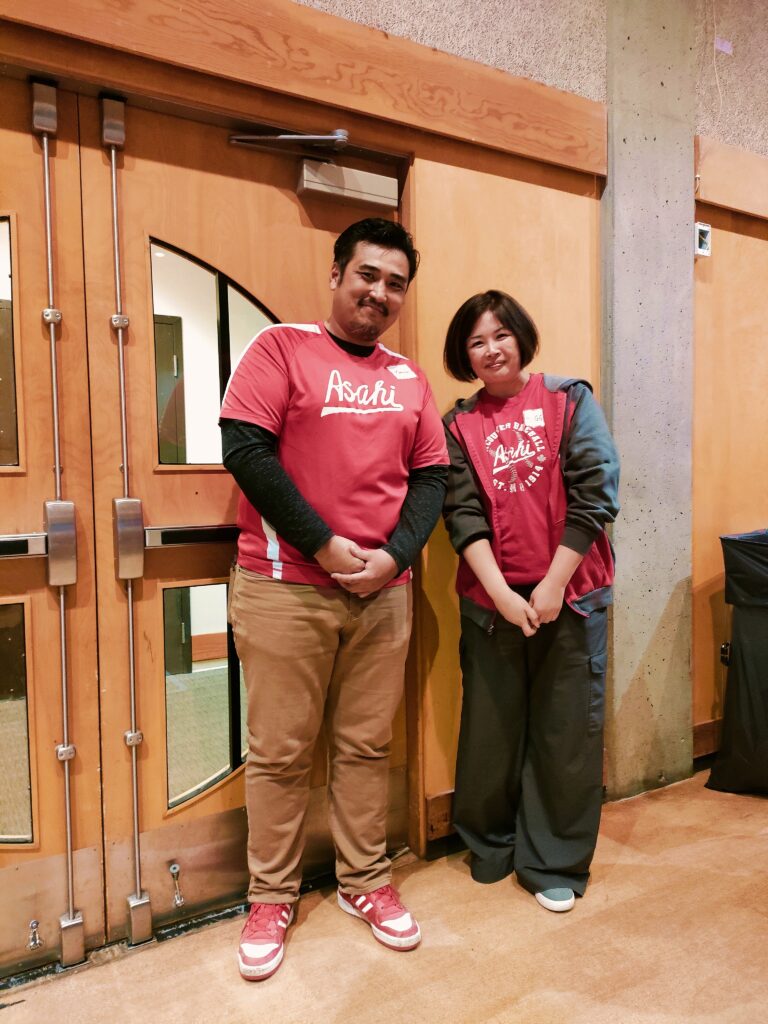
イベント時に、小川学さん(写真左)に朝日再結成までの経緯をお聞きすることが出来ました。
小川さんは世界を飛び回るスポーツ選手のトレーナーだったという背景があります。さらにご自身も野球と柔道を二足のワラジでプレーされていた過去をお持ちです。どの角度から見ても小川さんの人生はスポーツに特化しています。
そんなバックグラウンドを持つ小川さんが2003年にカナダに渡航し、色々な日系人と知り合っていくなかで、バンクーバー朝日を知ることになります。そして朝日の歴史を調べ、知れば知るほど深くのめり込んでいったそう。
そしてご自身がカナダで生きた証、恩返しとして「バンクーバー朝日を復活させる」という目標を立てます。そのため当初、小川さんは再結成に向けて個人的に活動していました。
2010年のバンクーバーオリンピックがあり某新聞社が取材をしてくれたりと、様々なコネクションを築いていきます。
しかし「良いコネクションは出来たけどその次のステップになかなかいけなかった」と小川さんは語ります。
そんな最中2014年に映画「バンクーバーの朝日」の放映を機に朝日の知名度は上がり、小川さんの個人的な活動とは別に当時野球をしていた日系の子供を持つ親御さん数名たちが、朝日再結成に向けて活動を始めます。しかし日本生まれ日本育ちの小川さんと、カナダ生まれカナダ育ちの日本人である日系の方々が関係を築く過程で、難しい部分もあったとか。
ただ小川さんとその親御さんたちを繋げた共通の友人の存在があり、協同に至ったそうです。
そしてついに2014年バンクーバー朝日が再結成されたわけです!
日本野球特有の礼儀やマナーの価値の高さ
日本ならではの礼儀やマナーを子供たちに学ばせるために、バンクーバー朝日への入団を希望する親御さんも多いそうです。
例えば、グランドへの出入りに一礼する。デッドボールを与えてしまったピッチャーが帽子を取って謝る。試合、対戦相手、審判、観客へのリスペクト精神。
日本のスポーツ選手たちの礼儀正しさは世界的にも高く評価され、オリンピックやワールドカップなどがあると度々報道されていますよね。
私が参加させていただいたイベント会場の選手たちもみんなとても礼儀正しく、102歳になられた上西ケイさんの大きなバースデーケーキを会場内の参加者に運んで回ってくれたり、イベント終了後の片付けや掃除も率先して手伝っており、日本野球のマナーから培われた礼儀を感じることが出来ました。
新たな角度から学ぶ日本の価値とバンクーバーの魅力
私は日本にいる頃から日本の文化をとても愛していました。
ただ一歩外に出ることで、自分が知らなかった部分である異国の地で日本人の誇りをもって闘ってきた日系人の歴史を知ることが出来ます。そこからまた自国への愛がさらに増します。
それと同時に、朝日軍が結成された当時に比べると、現在のバンクーバーいかに人種差別が少なく、多様性を受け入れる姿勢が整った住みやすい街であるのかを再確認します。でもそれは過去の厳しい状況の中、強く生き抜き、歴史を重ねた人たちがいるからこそ。
私がバンクーバー に来て約2年経ちますが、外国人や異なる文化に対しての差別を感じるシーンはほぼないと言っても過言ではありません。
それどころか勇気を出して自国を飛び出し、母国語ではない英語を使いながら海外で挑戦する姿勢をリスペクトしてくれる、そんな言葉をかけてくれる方々に出会います。
私にとって海外で生活しながら現地の日系の歴史を知ることは、日本とバンクーバーの両サイドの魅力への気づきに繋がるとても意味深い経験です。
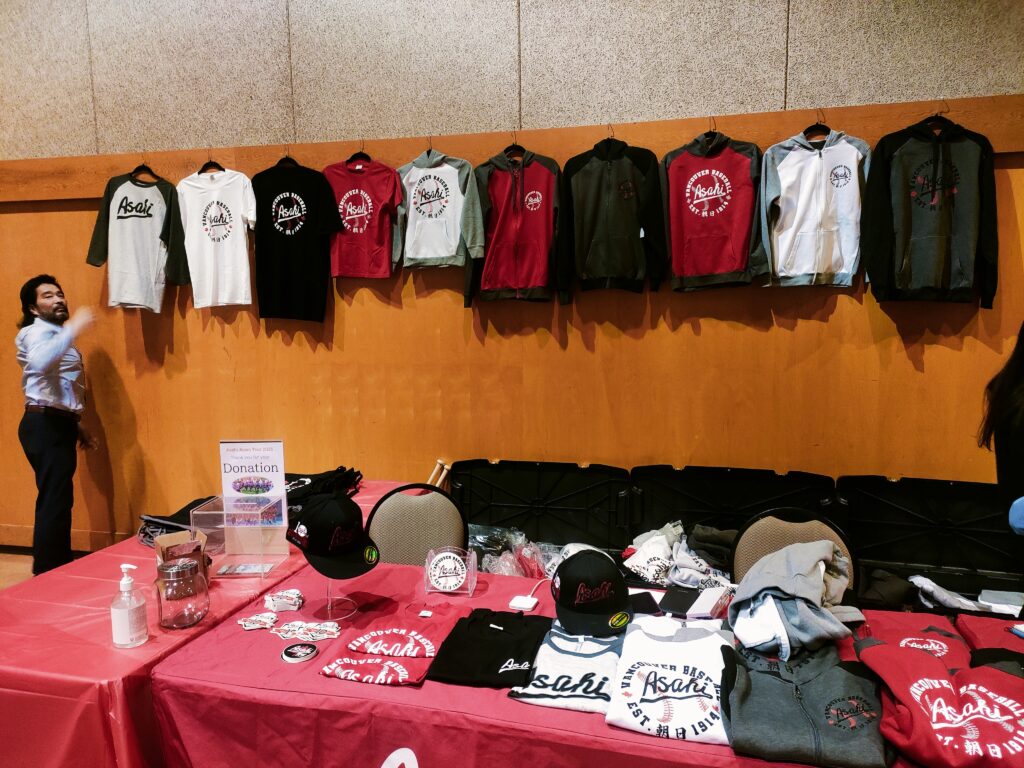
イベント会場では、バンクーバー朝日のグッズ販売も販売されていました。売り上げの全額が活動資金になるそうです。
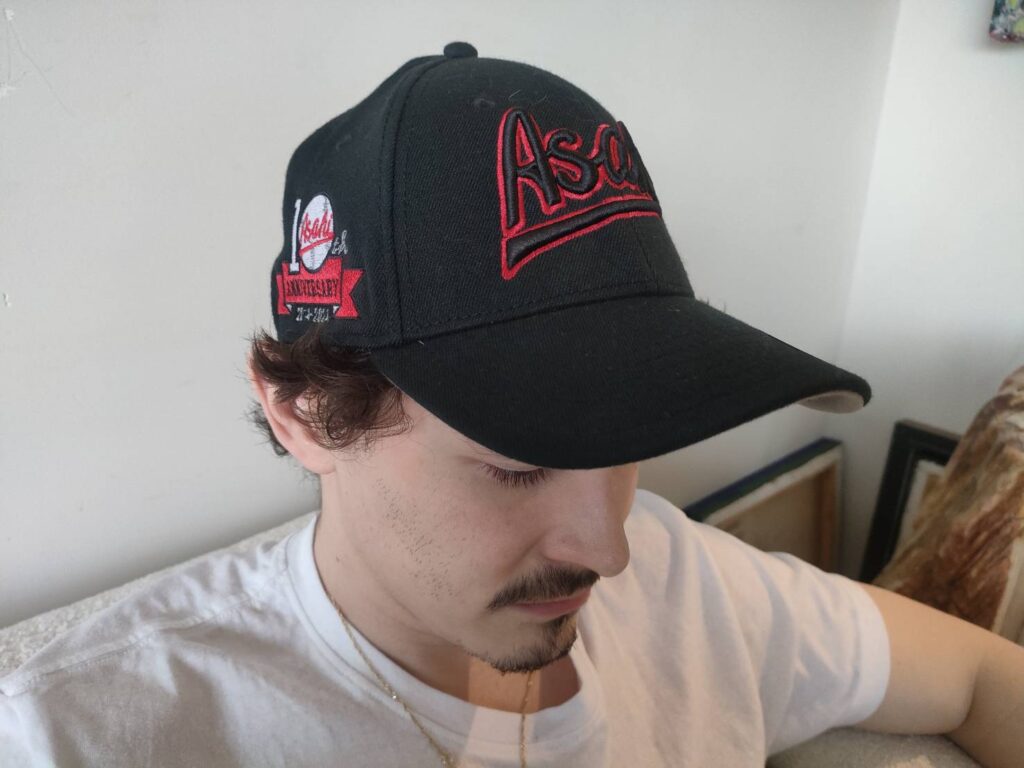
私はキャップ好きのパートナージョセフに、こちらの写真の10周年限定キャップを買って帰りました!
グッズの購入はバンクーバー朝日オフィシャルウェブサイトから https://www.asahibaseball.com
The history of the 1914-established ‘Vancouver Asahi’ baseball team, and the ‘Nea Asahi’ formed in 2014, carrying on the spirit of the Asahi
The opportunity to learn about the “Vancouver Asahi”
Do you all know about the baseball team called the “Vancouver Asahi” that was formed in Vancouver?
As a journalist, I had the chance to cover an event celebrating the 102nd birthday of Mr. Kei Kaminishi (pictured in the center of the group photo and on the right in the lower photo), the only living member who played for the Asahi team before the war and is currently active in the Vancouver Asahi team, on the occasion of the 10th anniversary of the establishment of the Vancouver Asahi team in January 2024. It was during this event that, to my embarrassment, I first learned about the existence of the “Vancouver Asahi.”
When I asked Mr. Kaminishi about his feelings during the event, he replied, “Memories from the past resurfaced, and it was very nostalgic.” I was honoured to meet him.
The History of the Vancouver Asahi Baseball Team
Before conducting the interview, I wanted to learn about the history of the “Vancouver Asahi” baseball team. As I began my research, I was moved to tears by their passionate story—a tale of strong Japanese pride, resilience in the face of racial discrimination, and their determined struggle.
Timeline of the Vancouver Asahi Baseball Team
Early 1900s: Vancouver had a vibrant Japanese district, but despite enduring racial discrimination and harsh low-wage labor conditions, the Japanese community worked diligently. Local white residents sometimes forced them out, claiming that Japanese individuals were taking away white people’s jobs. There were even instances of attacks on the Japanese district.
1914: In the midst of such challenging circumstances, the “Vancouver Asahi” baseball team was formed with the desire to showcase Japanese pride to the white community. Matsujiro Miyazaki became the first manager, earning the nickname “Basha Matsu” for his energetic personality.
Despite not speaking English, he selected around 15-year-old Nisei (second-generation Japanese Canadians) boys and began rigorous training, believing that even if they couldn’t speak English, they could play baseball. With support from the local Japanese community, the team underwent intense training and developed into a formidable unit.
1919: In its fifth year, the Vancouver Asahi achieved victory in the International League, a minor league.
1921: Facing a period of decline, the Asahi underwent a team reorganization, with Harry Miyazaki becoming the new manager. He recruited talented players from various white teams across British Columbia. Under his leadership, the team employed a tactical approach known as “Brain Ball,” characterized by solid defense and precise maneuvering, including bunting and hit-and-run plays.
1926: The Asahi achieved victory in the Terminal League, which they had joined the previous year. They also secured league championships in 1930 and 1933. During this time, manager Harry Miyazaki instructed players to avoid rough play and refrain from protests. This guidance aimed to prevent tensions between the Japanese and white communities, and as a result, the Vancouver Asahi became a team supported not only by the Japanese community but also by the white community.
1941: However, with the onset of the Pacific War, players were sent to prisoner of war camps or forced relocation sites, marking the end of the Vancouver Asahi’s history. Records indicate that players who had been part of the Asahi team at the time held baseball competitions within the internment camps.
2003: Induction into the Canadian Baseball Hall of Fame.
2005: Induction into the British Columbia Sports Hall of Fame.
The Vancouver Asahi team, which has been featured in numerous Japanese media outlets
In Japan, the Vancouver Asahi baseball team has been featured in numerous media formats, including documentaries, manga, and movies.
1994:TBS Television aired a documentary titled ‘The Unknown Canada Asahi Team’ on their program ‘JNN Houdou Tokushu.’ Teddy Furumoto, the son of a player who happened to watch the documentary, learned from a response to a letter he sent to the program’s producer that former Vancouver Asahi team members were alive and living in Canada. Furumoto traveled to Canada, met with the alumni, listened to the team’s untold stories, and subsequently wrote a book.
2008: The book ‘Vancouver Asahi Team’ was published by Bungeishunju. Subsequently, a manga series with the same title, based on this book, was serialized.
2002:A documentary film titled ‘Sleeping Tigers’ was produced.”
2010: Iwanami Shoten published ‘The Legendary Baseball Team: The Vancouver Asahi Story.’
2014: Director Yuya Ishii released the film ‘Vancouver no Asahi’ in Japan, featuring actors such as Sota Fukushi and Kamenashi Kazuya. The movie became a major hit, contributing significantly to the team’s recognition in Japan.
2017: The television program ‘Sekai no Mura de Hakken! Konna Tokoro ni Nihonjin’ interviewed Kei Kaminishi, the last living member of the Asahi team at the time, who was 95 years old.
Reference: Wikipedia, ‘Vancouver Asahi’ (as of February 20, 2024) [https://ja.wikipedia.org/wiki/バンクーバー朝日]”
In 2014, inspired by the history of the Vancouver Asahi baseball team, the ‘Shin Asahi’ (New Asahi) was reformed by the current manager, Mr. Manabu Ogawa, and others.
The Asahi team, which came to a close due to the Pacific War, left an indelible mark in history. Despite the challenging circumstances of that time, the indomitable spirit of the Japanese people, as demonstrated through baseball, made a lasting impression. Six initiators, including the current manager, Mr. Manabu Ogawa, moved to carry on the glory and spirit of the Asahi. Inspired by the Asahi spirit, they began their efforts to revitalize the Japanese-Canadian community.
Interview with Mr. Manabu Ogawa, one of the initiators of the Asahi team’s reformation and the current manager
During the event, we had the opportunity to hear from Mr. Manabu Ogawa (pictured left) about the process leading up to the reformation of the Asahi team.
Mr. Ogawa has a background as a trainer for athletes who travel around the world. Additionally, he himself has a history of playing both baseball and judo, demonstrating his multifaceted involvement in sports. From every angle, Mr. Ogawa’s life is focused on sports.
With such a background, Mr. Ogawa moved to Canada in 2003 and began to meet various members of the Japanese community. It was during this time that he became acquainted with the Vancouver Asahi. As he delved deeper into the history of the Asahi, his interest grew stronger.
Determined to leave his mark and give back to the community in Canada, Mr. Ogawa set a goal to revive the Vancouver Asahi. Initially, he worked on this project independently. The 2010 Vancouver Olympics provided an opportunity for media coverage from a certain newspaper, and Mr. Ogawa began to build various connections. However, as Mr. Ogawa recalls, “Although I made good connections, it was difficult to move on to the next step.”
In the midst of these efforts, in 2014, the broadcast of the movie “Vancouver no Asahi” led to an increase in the recognition of the Asahi team. Concurrently, several parents of Japanese-Canadian children who were involved in baseball at that time, inspired by Mr. Ogawa’s personal efforts, began activities towards the reformation of the Asahi. However, during the process of building connections between Mr. Ogawa, who was born and raised in Japan, and the Japanese-Canadian individuals born and raised in Canada, there were some challenges.
Despite these challenges, the presence of a mutual friend who connected Mr. Ogawa and the parents played a crucial role in facilitating cooperation.
Finally, in 2014, the Vancouver Asahi was reformed!
The high value of unique etiquette and manners in Japanese baseball
To instill the unique etiquette and manners specific to Japan, many parents express a desire for their children to join the Vancouver Asahi. For instance, bowing upon entering and leaving the field, a pitcher removing their cap to apologize after unintentionally hitting a batter, and fostering a spirit of respect towards the game, opponents, umpires, and spectators.
The sportsmanship and courtesy of Japanese athletes are globally acclaimed, often highlighted during events such as the Olympics and World Cup. Even at the event I attended, the players demonstrated exceptional courtesy.
They carried a large birthday cake for 102-year-old Mr. Kei Kaminishi to share with participants, and after the event, they took the lead in cleaning and tidying up. It was evident that the manners cultivated through Japanese baseball were deeply ingrained.
Discovering the values of Japan and the charm of Vancouver from a new perspective
While I was in Japan, I had a deep love for Japanese culture. Stepping outside, I’ve had the opportunity to learn about the history of Japanese-Canadians who, with pride, fought in a foreign land, revealing aspects I was not aware of. This has only deepened my love for my home country.
Simultaneously, compared to the time when the Asahi team was formed, I reaffirm how much more inclusive and racially tolerant Vancouver has become. It is now a comfortable city that embraces diversity. However, this transformation is a testament to the people who lived strongly through past challenges and accumulated history.
Having been in Vancouver for about two years, I can confidently say that scenes of discrimination against foreigners or different cultures are nearly non-existent. On the contrary, I encounter individuals who respect the courage it takes to venture out of one’s home country, use English as a second language, and face challenges abroad.
For me, understanding the history of the local Japanese community while living abroad is a profound experience. It leads to a greater appreciation for the charms of both Japan and Vancouver, fostering a meaningful connection between the two.
At the event venue, merchandise from the Vancouver Asahi is also available for purchase, with all proceeds contributing to their activities.
I bought the 10th-anniversary limited-edition cap for my cap-loving partner, Joseph, from the photo here!
To purchase merchandise, you can visit the Vancouver Asahi official website at https://www.asahibaseball.com“
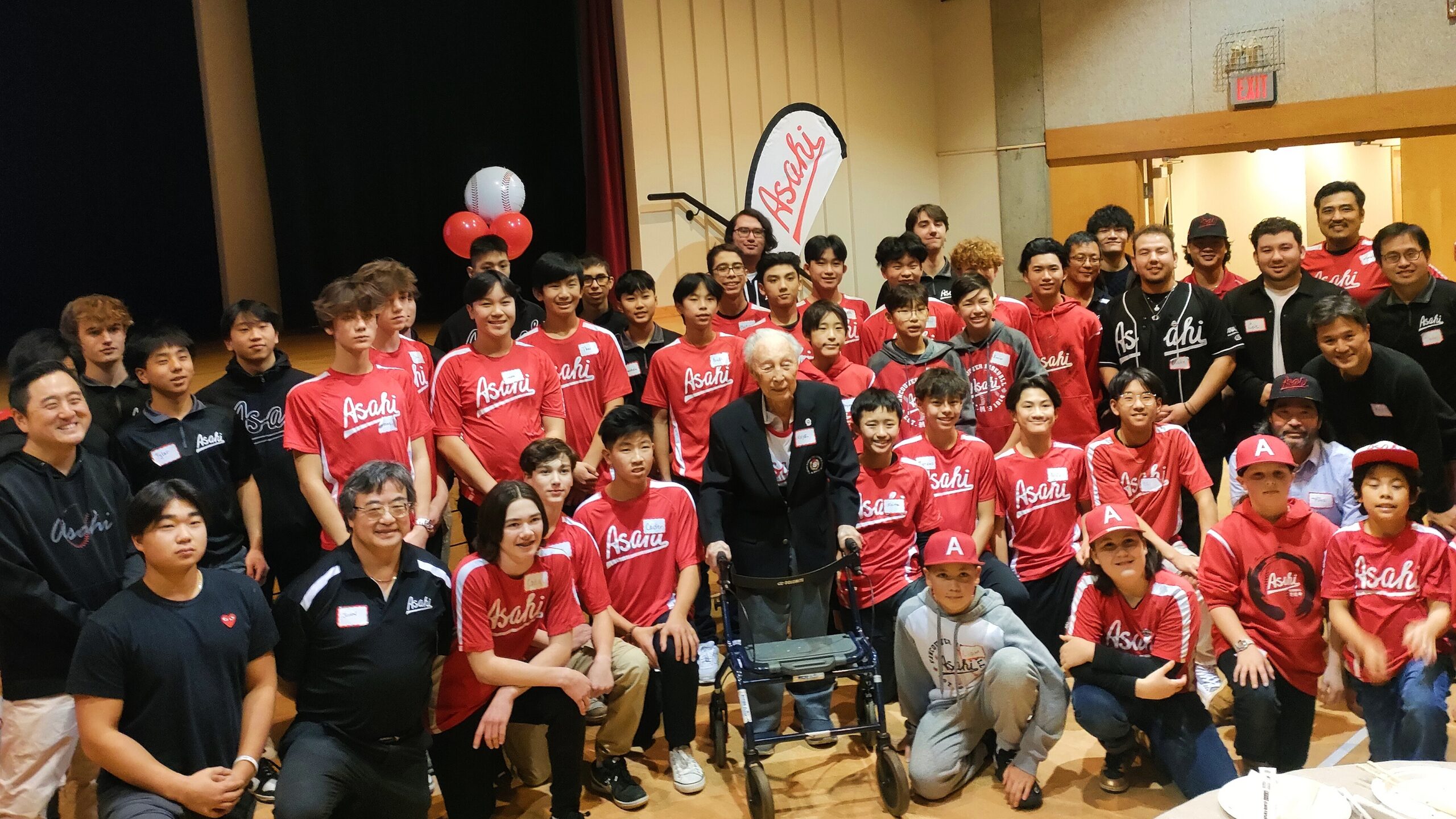
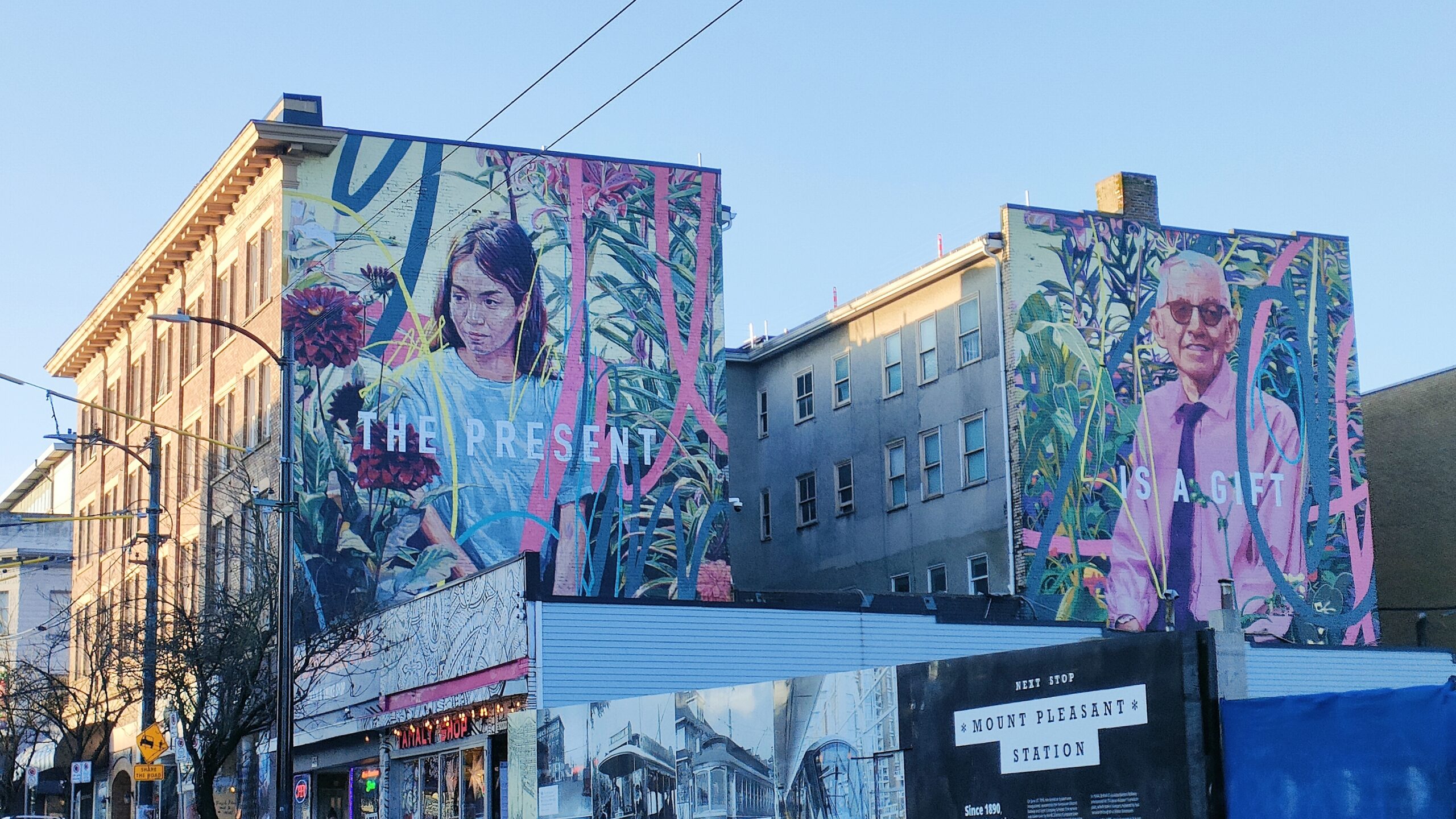
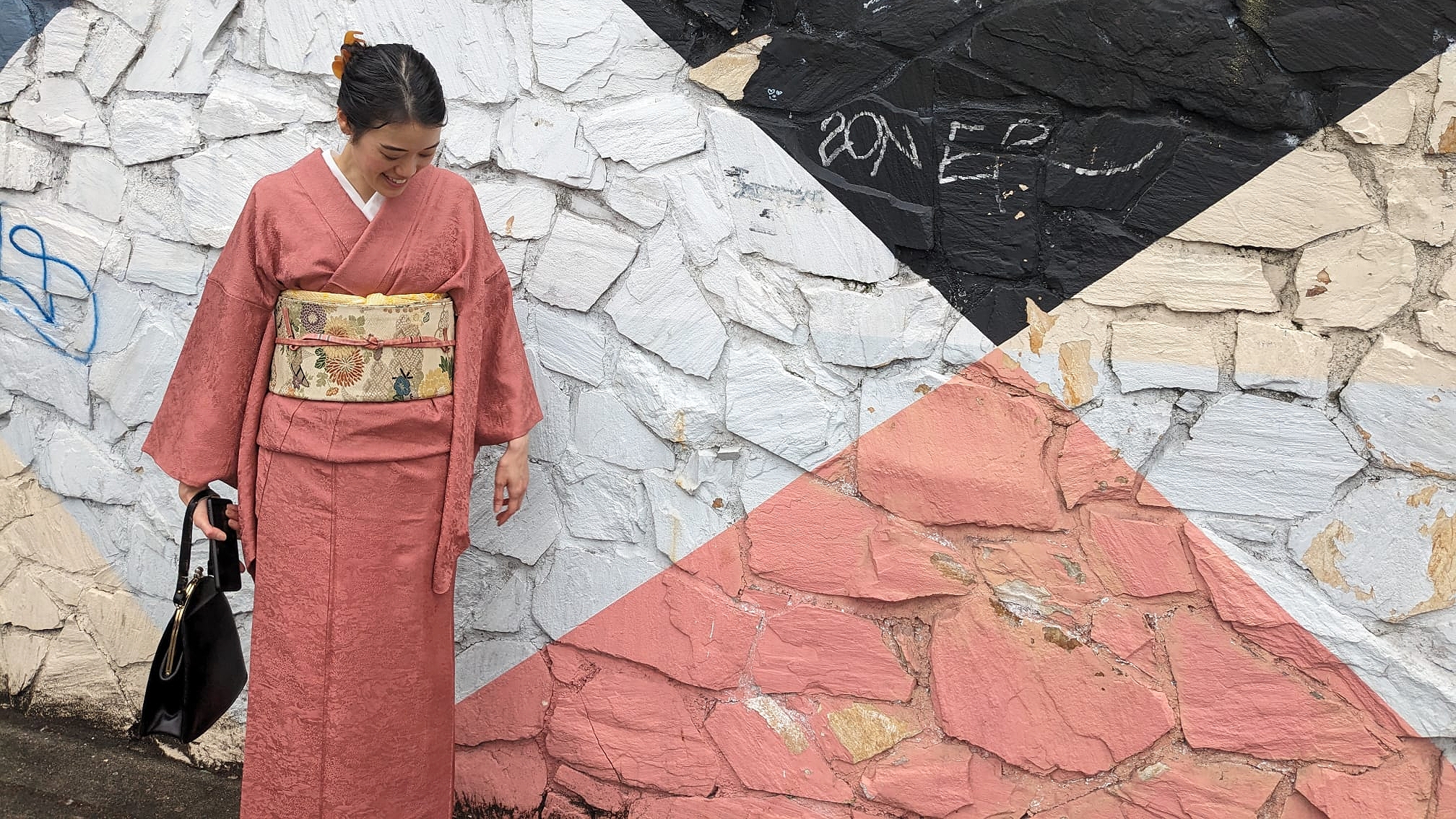
コメント